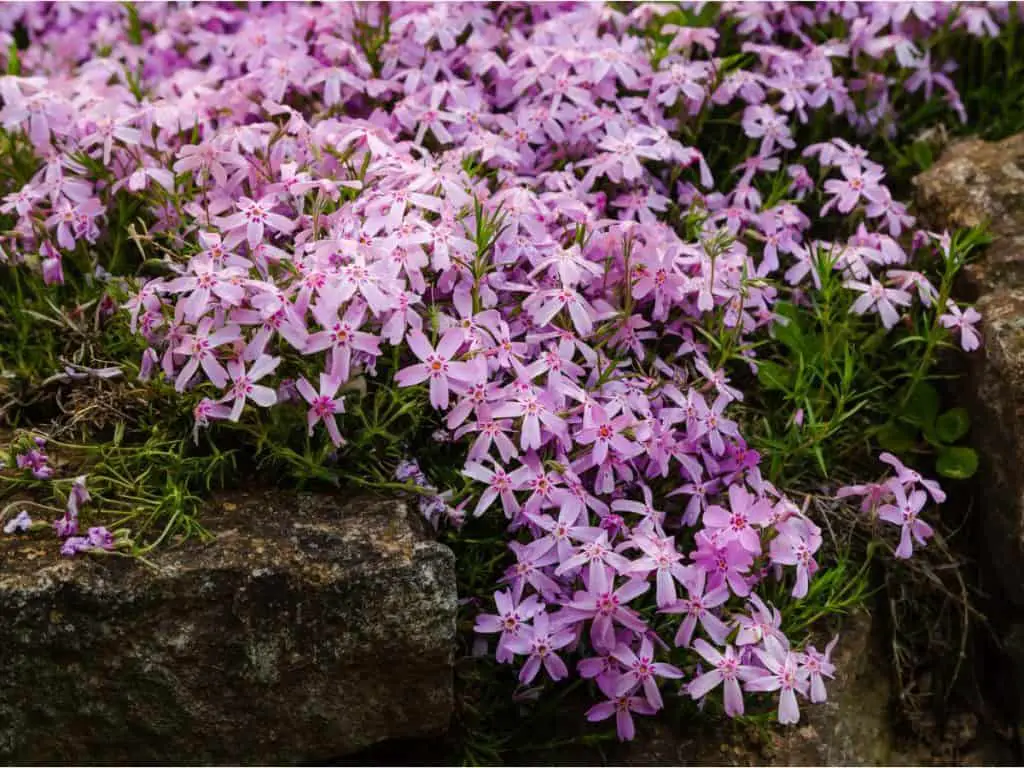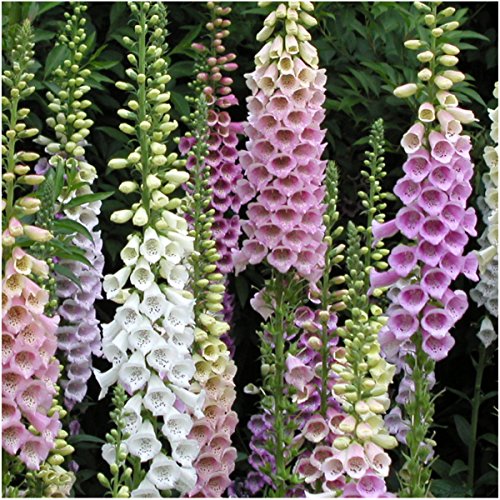11 Pollinator-Friendly Purple Perennial Flowers For Your Garden
This post may contain affiliate links. Please see the privacy policy for details.
There is something quite enchanting about purple flowers in the garden. Purple perennial flowers can be found nearly all year round from pale violet petals to deep, almost black shades.
They’re attractive, not only for you to view with your morning coffee, but also for local wildlife too. Pollinators such as bees and butterflies are drawn to the colour purple, perhaps due to many purple flowers having tubular or very open petals.

For a charming, almost country-cottage feel to your garden, consider planting a range of purple perennial flowers. Not only will you have the potential to enjoy flowers blooming during different seasons, but you will also provide essential food for pollinators to thrive.
Here is a list of purple perennial flowers for your garden:
African Daisy
Also known as Osteospermum Soprano Purple, this is a tall purple flower growing up to 14 inches. Almost daisy-like with long petals and a deep purple centre, this flower has a long blooming season between spring right up to the first frost. African daisies thrive best planted in full sunlight and well-drained soil.
Agapanthus
A magnificent flower with a tall stem reaching 60 cm in height. At the top of each stem grows multiple trumpet-shaped flowers with long stamen making this a firm favourite with pollinators. Flowers can bloom between July and September.
During the winter, agapanthus can lose some of its leaves due to being semi-evergreen. They require planting in an area with full sunlight and fertile, well-drained soil.
Anemone Nemorosa
Also known as Bowles’ Purple, Anemone Nemorosa is a beautiful flower with contrasting colours. Delicate rounded petals open wide to reveal long vivid yellow stamens.
Anemone Nemorosa is a spring-blooming flower in bloom between March to May and can grow up to 0.5 metres tall. Unlike the previous flowers listed, these are best planted in partial shade with some shelter from strong winds.
Buddleia
Buddleia is well known for its long cone shapes filled with tiny, delicate purple and lilac flowers. Also referred to as butterfly bush and for good reason, full of nectar, Buddleia are a firm favourite with butterflies.
Growing up to 12 feet tall and 8 feet wide, they do require quite a lot of space and are best planted along a border. They are generally easy to grow but do prefer to be positioned in full sunlight with well-drained soil.
Crocus
Crocuses grow in a range of colours, but purple croci are magnificent as they bloom when most of the ground is still recovering from winter. Crocus are early-blooming flowers that show in February and March. They provide essential food early in the year for pollinators.
Crocuses have round petals that face upwards surrounding bright yellow and orange stamens. They grow close to the ground, reaching just 2-4 inches tall, but provide a welcomed burst of colour in early spring.
Delphinium
A very tall, show-stopping flower that reaches 2 metres tall during the summer months. Each stem is full of wide-open flowers that grow all along the stem in a cone shape. With extra care after the summer bloom, you will often receive a second burst of colour with a display of flowers in September.
Delphiniums prefer to be planted in full sunlight with well-drained soil. They are heavy feeders and require fertiliser each week once shoots begin to show.
Foxgloves
These stunning perennial flowers grow outwards along each tall stem, with tubular-shaped flowers. With their shape, they attract helpful pollinators, especially bees, into your garden.
They are in full bloom between May and July but should be deadheaded at the end of the season to prepare them for the following year. Most foxgloves prefer to be planted in an area with full sunlight, but some will tolerate shade.
Please do note that foxgloves are incredibly poisonous and, if ingested, can kill an adult human. If you have pets, carefully consider whether you wish to plant foxgloves in your garden.
Hellebores
Hellebores make an excellent addition to any garden due to their blooming period. Unlike most flowers which bloom in Spring and Summer, hellebores are in full bloom during winter and early spring.
They grow in various colours, but purple shades can be found from lilac to almost purple-black with vibrant yellow stamen centres. Hellebores grow well in partial to full sunlight but need well-draining soil as they do not thrive in boggy conditions.
Hydrangea
Available in a range of colours, purple and lilac varieties are beautifully set against the deep green foliage. Hydrangeas make great pot plants or can grow into large shrubs up to 2 metres wide and tall.
Each set of flowers is grouped together into ball-like shapes that reach 30 cm wide. Hydrangeas bloom from mid to late summer and prefer to be planted in an area with partial shade.
Phlox
These small flowers make excellent border plants as they help to fill your beds and provide ground cover. Each flower grows in a cluster at the top of tall stems in a variety of purple shades.
They grow best in full sunlight and well-drained soil. With several different varieties, it is best to check your seed packets for when they bloom, but phlox can bloom between summer and autumn.
Wisteria
Another shrub only this time, each delicate lilac flower grows in clusters hanging downwards. Wisteria is beautifully planted alone as a tree but is commonly planted against a wall or fence to help hold up the thick branches and display the flowers when in bloom during May and June.
Wisteria prefers well-drained soil and is a heavy feeder so requires regular fertilising. Due to its form, it does require regular pruning to help shape and support it as it grows.
These varieties of purple perennial flowers will help to fill each area of your garden. From your property’s walls and fences to pots and garden borders.
By planting several from this list, you will find plants in your garden in bloom in every season. With crocus and hellebores blooming in winter through to wisteria in late spring and Agapanthus towards the end of the summer months.
Remember to consider which plants are best for your outdoor space, whether or not you have pets, and which flowers can encourage beneficial pollinators.
For more flower guides and inspiration for your garden, take a look at these posts:
- How to Pick the Perfect Perennials for Your Garden
- The Best Flowers for a Cutting Garden
- 7 of the Best Flowers for Hanging Baskets
- 5 Spring-Flowering Perennials to Brighten Your Garden After Winter
- 6 of the Best Yellow Perennial Flowers for a Beautiful Garden
- 8 Bold Winter Flowering Plants to Brighten Your Garden In Winter










